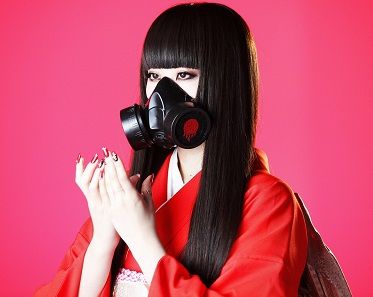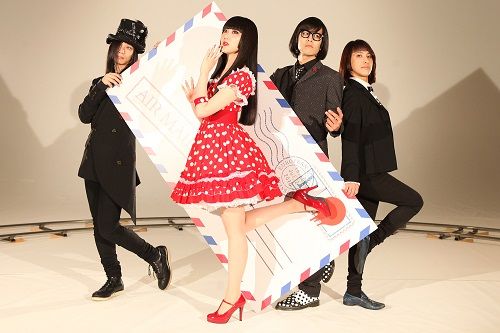
Interview by Miriam C.
 Japan, musically speaking, is a wonderland. Out of the blue, I’m not getting crazy : I’m simply stating the obvious. If in the 90’s the Japanese audience was able to (re)appreciate (and consequently support it) the entire AOR musical panorama while in the Western lands this musical genre was suffering a long crisis due of the arrival of the grunge now Japan is getting more and more accessible and a lot of brand new bands are approaching. It’s thanks to the Internet right now we’re able to know more Asian bands and through the years Japan was able to offer tons of acts from different musical genres, I mean it’s like going to a restaurant and choose what you like. That’s totally our case ’cause if vocalist Temma said at the end of our interview that “the internet has freed us” he’s right. So, after this long intro, it’s time to leave you for let you read this special and exclusive interview with the vocalists Temma & Yoko, the guitarist Shin and drummer Kei from the techno pop/electronic rock band URBANGARDE who has recently released their second album “Showa 90”. On top of this we should thank Resonance Media for helping us out.
Japan, musically speaking, is a wonderland. Out of the blue, I’m not getting crazy : I’m simply stating the obvious. If in the 90’s the Japanese audience was able to (re)appreciate (and consequently support it) the entire AOR musical panorama while in the Western lands this musical genre was suffering a long crisis due of the arrival of the grunge now Japan is getting more and more accessible and a lot of brand new bands are approaching. It’s thanks to the Internet right now we’re able to know more Asian bands and through the years Japan was able to offer tons of acts from different musical genres, I mean it’s like going to a restaurant and choose what you like. That’s totally our case ’cause if vocalist Temma said at the end of our interview that “the internet has freed us” he’s right. So, after this long intro, it’s time to leave you for let you read this special and exclusive interview with the vocalists Temma & Yoko, the guitarist Shin and drummer Kei from the techno pop/electronic rock band URBANGARDE who has recently released their second album “Showa 90”. On top of this we should thank Resonance Media for helping us out.
Hello there to everyone, welcome to Femme Metal Webzine! How are you?
Temma: I’m sick!
Yoko: Hello, sick people.
Shin: I’m always “Chuu Ni Byou” (acting like an eighth-grader). Thank you.
Kei: I’m always sick!!
First and foremost, would you like to introduce URBANGARDE. How and when the band was founded?
Temma: URBANGARDE was born when I was working in theaters, art, poetry readings, etc. In other words, it didn’t start as a form of music but it came to this after twists and turns. At the beginning, we didn’t have live shows in view of course and we had much more programming than we do now. Now, it’s become like an all-around performance with live music, artistic, and theatrical elements.
Yoko: I think that now we can perform in different ways between recorded music and live shows.
Shin: This is a group that Temma and I started. When we started, we used more programming than now and I didn’t think we’d be doing so many live shows.
Kei: I joined the group in 2015. Since then, I think there is more of a rock live-show feeling. At the same time, we’ve been actively doing conceptual live shows with stronger theatrical and artistic elements.
On Nov 9, you have released your second album “Showa 90”, what you can tell us about its genesis?
Temma: It’s the state of things in Japan and the world. It’s more like I can’t avoid this theme because it just comes into my sight, rather than choosing a theme on social issues. “Showa 90” is parallel to modern Japan. This is a war time and people are hiding their voice like ghosts.
Connected to the previous question, would you like to delve into and explain in detail more about the lyrics’ thematics?
Temma: “Kuchibiru Democracy”. At its hook, the phrase “Don’t kill. Don’t kill. Don’t kill the words” is repeated.
Yoko: “December, Showa 90” is a song that collects the themes of each song in the album.
Shin: The important songs for me on this album are “Kuchibiru Democracy”, “December, Showa 90” and “All Doubt Nippon”.
Kei: Same for me. “Kuchibiru Democracy”, “December, Showa 90” and “All Doubt Nippon” are strongly connected to the whole theme.

“Kuchibiru Democracy” is the lead song that back in November anticipated “Showa 90”, I know that many Japanese television stations refused to air the video. Do you think the media are afraid of the message that “Kuchibiru Democracy” is proposing?
Temma: I suppose it was considered dangerous. In Japan, the anticipation of judgement comes before actual moral or religious judgement, so they judged that our MV did not match the current feelings of their audience. On the other hand, I’m not surprised that it was rejected, actually, because it’s a keen caricature of the modern times.
Shin: They probably judged that it looks like something political or religious if only the video is seen without the sound.
Kei: I didn’t think this happen in current Japan, but it did. That’s the truth of the time we’re in now.
Would you like to tell us more about “Showa 90”‘s cover artwork. What it stands for and what is the vision behind it? And who’s the author of it?
Temma: Trevor Brown did the jacket art of our first album. He’s an artist with strong awareness of problems but the extremeness in his works made it difficult for him to work in his country (UK). This is why he came to Japan.
The girl with a gas mask standing in front of the collapsed National Diet Building may be another form of ourselves.
Yoko: Trevor always turns our music into a complete form of art.
Temma, I’ve read that in October you have released your first book called “Jisatsushatachi” (“Selfie People”) on October. Can you spend a couple of words about it?
Temma: The book contains fantastical and avant-garde short stories and poems about a girl in the modern times. The title story has double meaning as selfie and suicide. I modeled the girl’s desire for recognition after a death game that is played by idols defeating each other by repeating selfies. This may be considered as science fiction as well. Science fiction as a story form often pictures reality better than the visible reality in front of us.
Back in August, URBANGARDE accepted the invitation of Nagano hospital to perform for patients in the psychiatric ward and nursing home. How did you felt performing in a such peculiar place knowing that many of URBANGARDE‘s lyrics are related to psychiatry?
Yoko: Before joining URBANGARDE, I used to visit hospitals and nursing homes as a volunteer. The people staying in those facilities have limited time to enjoy music and entertainment in their daily lives, so I’d like them to spend some beautiful, dreamy time even if it’s only when we’re there.
Temma: I believe that music, in a sense, has a power over sick minds and hearts and that music stimulates courage for those living in solitude. So, it felt very natural to have a concert at a place like this.
Kei: I’m not really concerned about where I play but there are people who are unable to go to places to listen to music. So, I felt that they were super concentrated on listening to our performance.
What are your next band plans? Do you have any projects for an overseas tour?
Temma: First, we have a national tour in the spring and we will record a mini album which will be released only at the venues. I’d like to manage a full album again at the end of next year. Also, personally I have a novel release and an appearance in drama coming up. I’m busy!
Thank you so much for taking the time to do this. In conclusion, do you have any final words for your overseas fans? Thank you very much for your time!
Yoko: Thank you for finding URBANGARDE!
Temma: The internet has freed us and made it possible to listen to music of foreign musician (URBANGARDE, for example) anytime and anywhere. On the other hand, inconvenience may be the most luxurious thing now, I think. A place existing only now and here, not anytime and anywhere. In other words, I’d like to have a unique, one-time-only live show in your town. Please wait for us.
Shin: Thank you so much for becoming URBANGARDE‘s fan regardless of distance or borders! Thanks to the internet, we can give you latest information no matter how far you are. We may be able to go to your country, so please look forward to it!
Kei: We will come see you, and we want you to come see us!
[youtube=https://www.youtube.com/watch?v=k9xlflY-PH8&w=450&h=253]
Links